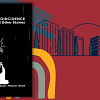From breezy musings to gusty convictions

While browsing my social media one fine evening last year, I came across an article titled, "If you pay peanuts, you get monkeys". I found the title intriguing and began to read. The Daily Star opinion piece, authored by academic and writer Shamsad Mortuza, presented the argument that pay affects the quality of teaching. Professor Mortuza explains how a black-and-white increase in pay would not improve the quality of our current stock of teachers. "If teaching is really poorly paid in relative terms, then one would expect that only the less able would end up in the job," he writes. Therefore, while offering higher salaries can surely attract better quality teachers in the future, "it would take 30-40 years to complete the cycle to replace the existing stock with better recruits".
I ruminated over this argument and from then on, whenever I encounter an article by Shamsad Mortuza, I instinctively proceed to read it.
I willingly obliged to review it when I recently found out that Shamsad Mortuza has compiled the articles published under "Blowing in the wind", his The Daily Star Opinion page column, into a book with the same title. Unsurprisingly, I discovered that I had already read several articles in the compilation. Did that dampen the experience? Not at all.
This is because of the way the book is structured. It is evident from the collection that, alongside serving as a Professor of English, a Fulbright-winning educator, and his administrative roles as the Pro-VC and now a Special Advisor to the Board at ULAB, Shamsad Mortuza's career as a columnist has adeptly covered a diverse range of subjects, while also bearing an extensive focus on education. He has published over 180 articles thus far in his time as a columnist, and the book is quite uniquely curated, segmented according to the significance of the issues addressed. Derived from the title, Blowing in the Wind, the compilation is divided into seven sections, with each section bearing the name of a specific type of wind, covering articles that differ according to the force with which the author approaches the issues. "Sometimes the wind is mild like zephyr", he points out, "at other times it is gusty like a gale".
Blowing in the Wind thus starts with a segment titled 'Zephyr', which can be defined as a light breeze. The very first article here, titled "On Being 'Silly'", tackles some heavy topics, such as the negligence of our medical practitioners and the mismanagement of our healthcare system. He interweaves his personal narratives along with external anecdotes to shed light on the dehumanising aspects within our present-day medical system. In one instance he relates the tale of his own father and his battle with cancer. During a gallbladder operation, the surgeon had seen the growing tumour but chose to ignore it, as it did not fall within the "treatment package". The article then goes on to relate the story of a grieving father who arrives at the Supreme Court with his newborn twins after three hospitals refuse them treatment. Professor Mortuza does not delve too deep into these topics with facts and figures in this section, instead choosing to breeze through them with heartrending examples.
As you go through the book, you face heavier winds. In the section titled 'Gale', Professor Mortuza explores the history of the establishment of our education system, the contentious nature of the semester system at our universities, the issue of campus ragging, corruption within our educational institutions, and various other compelling topics. In this section, he faces the topics head on. In the article titled "University education: one size fits all", Mortuza argues that the current university system is designed for a narrow range of students and that it fails to accommodate the diverse needs and aspirations of individual students.
While I had read some of these articles previously in the newspaper, finding them organised thematically in a book allowed me to gain a deeper understanding of the perspectives Professor Mortuza has tried to share. One of the most admirable aspects of his writing, and what drove me to read his articles initially, is his ability to tackle complex issues with clarity and insight, as well as his decision to incorporate pop culture into his arguments. He has a gift for combining personal experience with broader social and political analysis, creating a rich tapestry of ideas while forming a connection with readers.
The writer's attachment to pop culture is also evident in the naming of his book and the column itself, if you haven't already guessed. Both are named after the Bob Dylan song of the same name. Just as the song suggests that finding answers to life's biggest questions is like trying to catch something blowing in the wind, Shamsad Mortuza's compilation of articles tries to ask questions, the answers for which are ever evasive.
Tasnim Odrika is a biochemist by day and a writer by night. Reach her at [email protected].

 For all latest news, follow The Daily Star's Google News channel.
For all latest news, follow The Daily Star's Google News channel. 








Comments